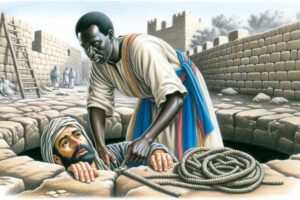
Joshua: Successor of Moses, led Israelites into the Promised Land
Joshua, a central figure in the Hebrew Bible, played a pivotal role in the history of the Israelites as detailed in the book bearing his name. Here are some succinct facts about him:
- Successor of Moses: Joshua was appointed by God to succeed Moses as the leader of the Israelites (Numbers 27:18-23). This transition marked a significant moment in Israelite history, as Joshua was charged with leading the people into the Promised Land.
- Military Leader: Joshua is renowned for his military acumen, leading the Israelites in a series of battles for the conquest of Canaan, the Promised Land (Joshua 6-12).
- Faith and Obedience: Joshua is celebrated for his unwavering faith in God and his strict adherence to God’s commands, characteristics that were pivotal to his success in leading the Israelites (Joshua 1:7-9).
- The Fall of Jericho: One of the most famous episodes under Joshua’s leadership is the miraculous fall of Jericho’s walls, demonstrating God’s power and the effectiveness of Joshua’s faith and obedience (Joshua 6).
- The Covenant Renewal: Joshua was instrumental in renewing the Covenant between God and Israel, emphasizing the nation’s commitment to follow God’s laws (Joshua 24).
- Tribal Allotments: Under Joshua’s leadership, the land of Canaan was divided among the twelve tribes of Israel, fulfilling God’s promise to Abraham about the land for his descendants (Joshua 13-21).
- Legacy of Faithfulness: Joshua’s farewell address in Joshua 24 highlights his commitment to serving God and sets a standard for the Israelites to follow in serving God faithfully.
The life of Joshua, as depicted in the Hebrew Bible, offers a profound study in leadership, faith, and divine guidance. His narrative is primarily found in the Book of Joshua but is also mentioned in other parts of the Hebrew Bible, such as the Pentateuch and the historical books. Joshua’s life can be analyzed through several key aspects: his role as Moses’ assistant, his leadership in the conquest of Canaan, his faith and obedience to God, and his legacy.
Early Life and Preparation for Leadership
Joshua, son of Nun, of the tribe of Ephraim, first appears in the narrative of the Exodus. His early role as Moses’ aide-de-camp (Exodus 24:13; Exodus 33:11) set the stage for his future leadership. This period under Moses’ tutelage was crucial, as it prepared Joshua not only in the practical aspects of leadership and military strategy but also in spiritual discernment and faithfulness to God. Joshua’s participation in the battle against the Amalekites (Exodus 17:8-16) showcased his early military capabilities and his reliance on divine support.
Spy Mission and Demonstrated Faith
Joshua was one of the twelve spies sent by Moses to scout the land of Canaan (Numbers 13-14). Among the spies, only Joshua and Caleb trusted God’s promise to give Israel the land, despite the daunting report of the other spies. This incident highlighted Joshua’s exceptional faith in God’s promises, setting him apart as a leader of strong conviction.
Succession of Moses
Joshua’s appointment as Moses’ successor (Numbers 27:18-23; Deuteronomy 31:7-8) was marked by God’s command to be “strong and courageous.” This divine admonition was foundational for Joshua’s leadership, emphasizing the necessity of courage rooted in faith and obedience to God’s law.
Conquest of Canaan
The Book of Joshua narrates the Israelites’ conquest and settlement of Canaan under Joshua’s leadership. This period was characterized by miraculous victories, such as the crossing of the Jordan River (Joshua 3) and the fall of Jericho (Joshua 6), demonstrating God’s power and faithfulness. Joshua’s military strategy, combined with his commitment to God’s commands, led to the successful conquest of the land, fulfilling the promise made to Abraham, Isaac, and Jacob.
Distribution of the Land and Covenant Renewal
Following the conquest, Joshua was responsible for the allocation of the land among the tribes of Israel (Joshua 13-21), ensuring the fulfillment of God’s promise of a homeland for His people. Joshua’s renewal of the covenant at Shechem (Joshua 24) reaffirmed Israel’s commitment to worship and obey God alone, highlighting the covenantal relationship between God and His people.
Legacy and Death
Joshua’s farewell speeches (Joshua 23-24) encapsulate his legacy—a call to faithful obedience to God and a warning against idolatry. His death and burial in the land of his inheritance (Joshua 24:29-30) marked the end of an era but left a lasting impact on Israel’s history.
Theological and Historical Significance
Joshua’s life is a testament to the power of faith in God’s promises and the importance of obedience to God’s commandments. His leadership illustrates the biblical theme of divine guidance and support for those who follow God wholeheartedly. Theologically, Joshua’s story is a narrative of fulfillment, judgment, and grace, reflecting God’s sovereignty and faithfulness in redemptive history.
Historically, the conquest of Canaan under Joshua has been a subject of much discussion and debate among scholars. The archaeological and historical evidence for the conquest is complex, with scholars proposing various models to understand the process of Israel’s settlement in Canaan. Nonetheless, Joshua’s figure stands as a model of faithful leadership and commitment to God’s purposes, offering enduring lessons for faith communities throughout the ages.













